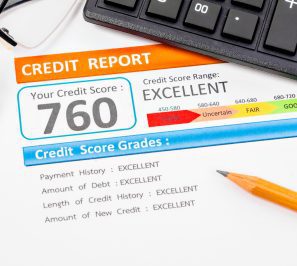Blog
Four Steps for Rebuilding Your Credit after Bankruptcy

If you owe past due amounts on credit cards and loans and are having trouble meeting your monthly bills, filing for bankruptcy can provide you with the fresh start you need to get back on track financially. Most people worry about how filing will impact their credit score, but eliminating your debt can actually have a positive impact in the long run. After your bankruptcy is completed, there are easy steps you can follow to begin rebuilding your credit in as little as a year.
Rebuilding Your Credit
Bankrate advises that while a bankruptcy will generally remain on your credit report for anywhere from seven to ten years, your credit score may get better within just a few months after filing.
If you were struggling with lots of debt equaling more than what you make each month, this reflects badly on your credit report and lowers your score. Not being able to make regular payments and having accounts handed over to collection agencies does major damage as well. Under these circumstances, the impact of filing bankruptcy is most likely not as bad as continuing in your current situation of high debts, unpaid balances, and late or missed payments.
Within the first year of filing for bankruptcy, you may notice your credit rating slowly increasing, even if by no more than a point or two each month. Nerdwallet recommends taking the following four steps to help speed this process:
- Check your credit report: Do this immediately after your bankruptcy is approved to make sure all of the debts included in your filing are eliminated.
- Know your credit score: Make note of your credit score and monitor it every few months using a free service.
- Use secured credit: Get a secured loan or credit card and begin using it for minor purchases, Keeping the balance low and making steady payments on time each month is an important part of improving your credit rating.
- Move on to unsecured credit: Once you have made regular on time payments for a period of months, go ahead and apply for an unsecured credit card. Continue to use it sparingly, making sure your balance never goes to more than 30 percent of the available credit limit.
Using this formula, Bankrate claims that most people can achieve a solid credit score in as little as a few years. To find out more about taking charge of your finances and improving your credit, call or contact the Law Office of Karen E. Evangelista, P.C. online today. We can arrange a free consultation with an experienced Rochester bankruptcy attorney who can help you get back on the right financial track.



